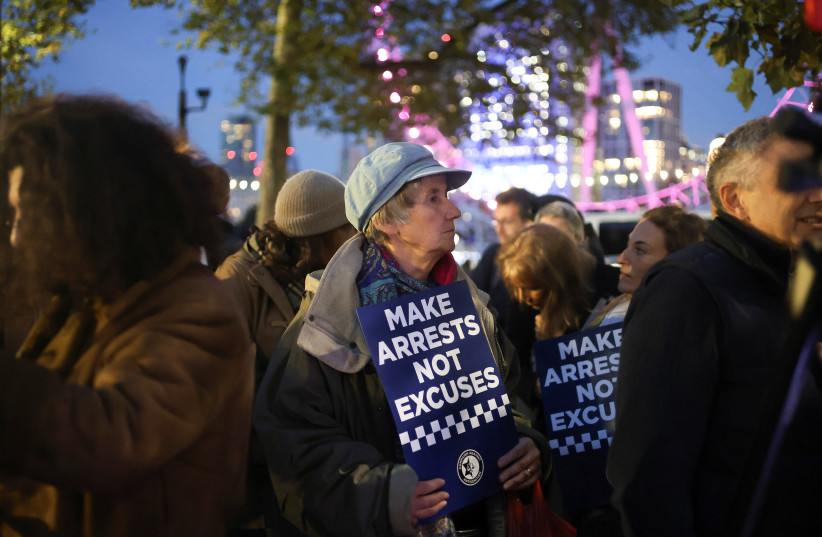The surge of anti-Israel vitriol that has coursed through major cities and college campuses and has flooded social media since October 7 has found some unlikely amplifiers and enablers.
Among the most strident voices condemning Israel for defending itself, accusing the Jewish state of “genocide,” blaming the country for the massacre of its own citizens, and either implicitly or explicitly justifying Hamas’s unspeakable atrocities, have been individuals and organizations that identify as Jewish.
Groups like IfNotNow, the Orwellian-named Jewish Voice for Peace, and others, have been front and center at massive anti-Israel demonstrations, and individuals wearing kippot and wrapped in tallitot have drawn camera lenses in public protests against the Jewish state. Members of the viciously anti-Zionist hassidic sect Neturei Karta have featured prominently in anti-Israel rallies in recent weeks, as they have many times in the past.
The presence of identifiable Jews at these protests – many of which have featured openly antisemitic chants and calls for the eradication of the State of Israel – would seem to support the oft-repeated mantra that anti-Zionism isn’t antisemitic. How could it be when there are Jews who identify as anti-Zionist?
But dig a little deeper and another reality emerges.

The American Jewish Committee’s annual survey of American Jews and the US general public shows that both Jews and non-Jews in America view anti-Zionism as antisemitic. When asked whether the statement “Israel has no right to exist” – the primary ideological statement of anti-Zionism – is antisemitic, more than 85% of both American Jews and non-Jews said that it is.
People know hate when they see it. And they can also follow basic logic.
All nations possess the right to self-determination; the United Nations Charter says so explicitly. That premise is the very basis of the contemporary world order. The Jews, as a nation, have that right, as well – and the modern movement for the realization of that right, the liberation movement of the Jewish people, is known as Zionism. To reject Zionism – that is, to deny the Jewish people, and only the Jewish people, a right afforded to all nations – is to discriminate against Jews. And that is the textbook definition of antisemitism.
How, then, do we square the understanding that anti-Zionism is antisemitic with the reality that some Jews, for whatever reason, identify as anti-Zionist?
The reality is that there have always been members of various groups that have rejected or even actively opposed their groups’ liberation movements. There were women who opposed women’s suffrage and there were African Americans who opposed the abolition of slavery. But that did not make the movements for women’s suffrage or for the abolition of slavery any less legitimate or opposition to them any less bigoted.
Likewise, the fact that there is a small minority of Jews who identify as anti-Zionist does not make Zionism any less legitimate or opposition thereto any less antisemitic.
As these individuals march under banners reading, “Not in our name,” now is the time to turn that slogan right back at them.
Anti-Zionist Jews are not representative of the Jewish community and they don’t speak in its name. They are as Jewish as the Westboro Baptist Church is Christian.
The vast majority of Jews support Israel, regard themselves as Zionists, and consider anti-Zionism to be a form of antisemitism. They celebrate Israel’s triumphs and mourn its tragedies. Their synagogues and communal institutions fly the Israeli flag, they rejoice on Israel’s Independence Day, they travel – and send their children – to Israel, and they view their attachment to the Jewish state as an integral part of their Jewish identity.
According to the AJC survey, a whopping 86% of American Jews view the anti-Israel Boycott, Divestment, and Sanctions (BDS) Movement as infected with antisemitism.
As anti-Israel demonstrations fill city streets and flood college campuses, using token anti-Zionist Jews as fig leaves to legitimize their hate, the Jewish community needs to speak out and say clearly: “Not in our name.”
Anti-Zionism is antisemitism. The Jewish community knows it. The public knows it. And it’s time to say so.
